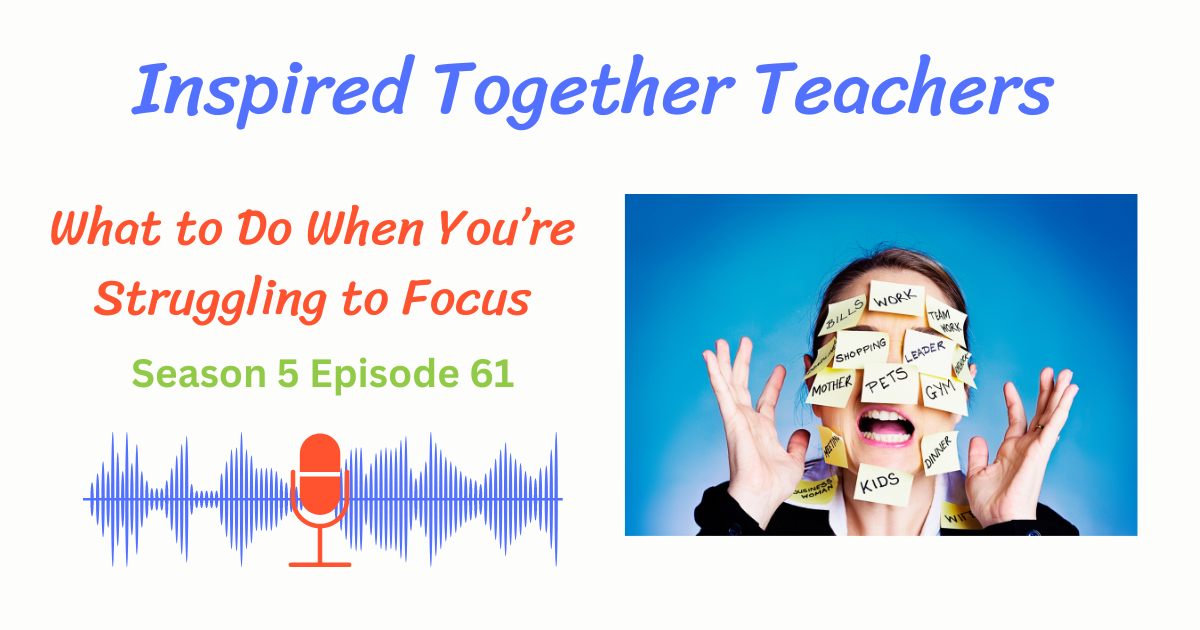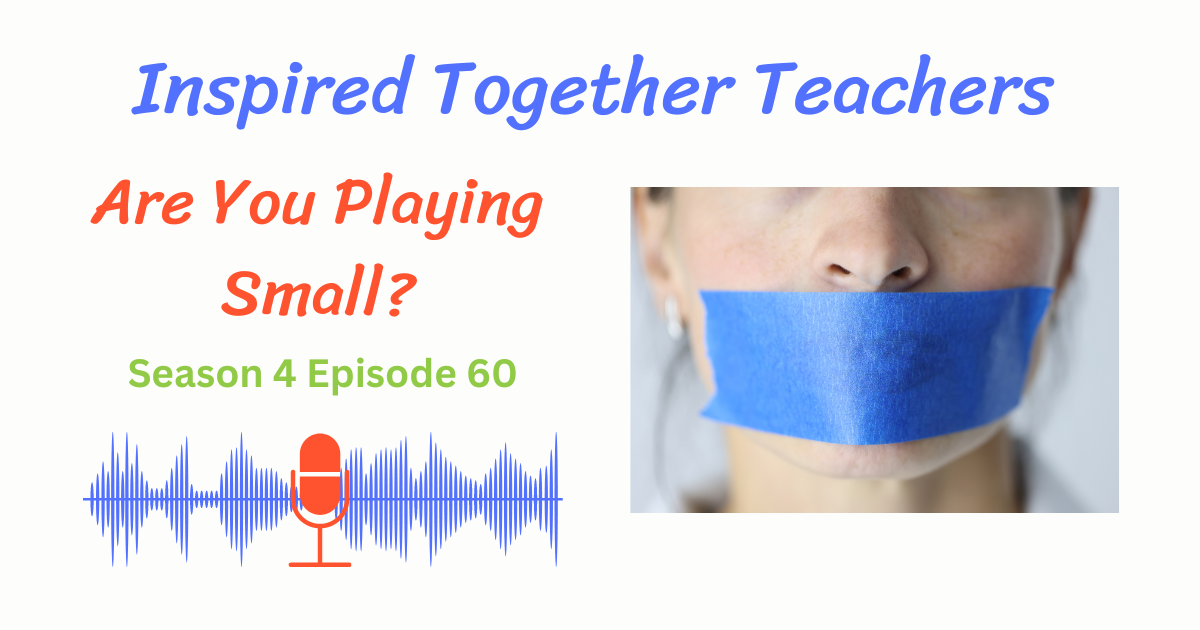Spring Cleaning Your Life S. 5 E.63
 You spring clean your surroundings, why not your life? Check out this episode to see how it might be time to do some spring cleaning in your life to bring your life closer to your intentions and values!
You spring clean your surroundings, why not your life? Check out this episode to see how it might be time to do some spring cleaning in your life to bring your life closer to your intentions and values!
Show Notes:
Episode Summary:
Have you considered what a spring cleaning of your life would look like? This is the perfect time to do it!
As we record this, spring is finally here. The winter has come to an end and the season of renewal is upon us. In the spring, many of us are doing spring cleaning of our homes or our classrooms so our physical spaces can reflect the renewal and hope of the spring season.
Join us today as we explore how to do a little spring cleaning of our lives so we can open up to fresh new ideas.
In this episode:
These shownotes are a summary of the content. We always give examples and stories from our own lives that are not in the show notes. We recommend you listen to the episode to get more!
Introduction:
Here in the Midwest of the United States, where we are recording, we are entering the wonderful season of Spring. The grass is turning green again, the snow has all melted. The flowers are just poking up out of the ground and bright green leaves are appearing on the trees.
There is a special kind of energy about spring. It stays light longer during the day and we feel a renewed sense of energy and enthusiasm to tackle big projects. That’s why spring cleaning is such a common occurrence. It conjures up a feeling of accomplishment and tackling big projects that we didn’t have the energy for during the cold dark winter days. Our window are open, fresh air is blowing in, and our energy levels are heightened.
Washing windows so the let gets in, clearing out clutter, removing extra pillows and throws- opening up and lightening everything
Spring Cleaning Your Life
We often do a little spring cleaning in our homes or our classrooms, but have you considered spring cleaning your life?
After a long winter and several months of school, it is time for a fresh start. In addition to a general clean-up, spring is also a good time to assess how your life is functioning and make a few changes to enhance your work and home environment.
Think about the questions you ask yourself when doing spring cleaning. What projects should I tackle? What needs to be cleaned or sorted out? What big projects, such as cleaning out the yard, or planting flowers do I need to do? What would give me a refresh or a sense of renewal?
You will notice that you can use similar questions about spring cleaning your life, that you use for spring cleaning your spaces.
Today, we will explore just a few key spring-cleaning suggestions that will shape how you spring clean your life.
Identify areas of your life need a “general cleanup.”
Just like in our homes, things in our life start to pile up and eventually we no longer see the piles. Take a look around. Do you need to clean up some clutter in your life? That clutter could be people or things. Are there parts of your life that look or feel shabby and outdated?
For example, you might have a former friend or relationship that isn’t working in your life anymore. Maybe it is time to let that relationship come to its inevitable end. Or maybe you need to give your shutters a fresh coat of paint, or it is time for a new haircut for yourself.
Does your life need some organization, perhaps a better calendar system or an app to help you stay organized? Maybe it is time to finally set up that family command center.
Are there things you used to do that have collected dust but should now be dusted off and brought back to life? Maybe you have an abandoned hobby or exercise equipment that you want to incorporate back into your life.
These are all types of things that could be part of your general clean up.
Whenever possible, engage the important people in your life in helping with the general clean up.
Just like any general cleanup, don’t try to tackle it all at once. Break up the tasks.
Once you do that general cleanup of things in your life, you’ll be amazed at how much better you will feel.
Look for inspiration to bring fresh ideas into your life.
We want to be clear on this….we are NOT suggesting that you compare yourself to others. Everyone has their own strengths and weakness. As we often say, comparison is the thief of joy. So we don’t want you to compare. However, others may see possibilities and ways of living that you don’t see.
For your teaching, you could get ideas while visiting other classrooms. For your life, you could look around and see what you love in others’ lives and decide if you want those things in your life. Just like you can go on a Tour of Homes to get inspiration from others, consider doing a Tours of Lives, thinking about what you admire and desire in others’ lives that you could add into yours in some way.
Ensure that your life looks and feels inviting to you.
Imagine if the you that you were several years ago, were to step into your current life. Would they find it an inviting place, a place they would want to not only visit but to stay for awhile
This might be a physical space, but it also might be a mental space. What would they feel if they stepped into your shoes the way you are now?
What does that you of the past see when you look in on your life?
Does the life you have seem like it welcomes you in or do you feel overwhelming and disappointed looking in? What would you need to change to make your life into a life where
In some cases, your life might be a big, general overhaul and sometimes it might take just a few little finishing touches to your life that can add a lot.
Think about what you do in your house for spring cleaning to make your house more inviting. You might add a new a lamp or a new plant. In your classroom, you might add a bright spring bulletin board or door decoration.
What could you do to make your life feel more inviting? It might be adding little touches like a monthly coffee with a friend or a weekly phone call with your sibling. Maybe you need a bit more quiet time.
Would your life feel better with more fun activities in the mix? Maybe you need to plan a few outings with your family or friends to enjoy something fun like a hike, a visit to a zoo, or tickets to a concert or play or art exhibit.
Examining how your life feels will naturally lead you to examining how well your life aligns with your values.
Reflect on how closely your life allows with your values.
Do you value family time but realize you have very little of it? Do you value learning new things but realize you haven’t made time to read or engage in personal or professional development?
In our book, The Inspired Teachers Journal: A Weekly Guide to Becoming Your Best Self, we talk about designing your life, and that rather than passively accepting whatever comes your way, you can proactively decide what you want your life to look like. You create a vision of how you want your life to look and feel, and how you want to be and act in your life.
That vision becomes both a guiding light for your life, and also a touch stone. You can take the time to reflect on where you are now and how you want your life to be and look for the next steps to take you where you want to go.
While that reflection is good any time of year, it is a natural process in the spring when we are looking forward to light and energy and summer just around the corner.
You can ask yourself, “ where am I aligning with the vision I have for my life? Where am I missing the mark? How can I take steps to get closer to where I want to be?” Then you can choose a few small things to implement.
Conclusion:
Spring cleaning your life will give you a fresh start and it will energize you.
With several months of the year ahead, we think spring cleaning your life is worth the time and effort. Not only will it help you enjoy your life, it will help you to live an inspired life!
Recap:
Spring cleaning is a great idea. Not only can it help you get your home and classroom in order bringing a sense of renewal and energy, it can do the same for your life. Look at your life and decide if it needs a general clean-up, a little inspiration, or a realignment to bring your closer to your values and to the life you want to live.
Connect with the Inspired Together Teachers Community:
Website: https:www.inspiredtogetherteachers.com
Instagram: Inspired-Together-Teachers
Facebook: Inspired Together Teachers
Facebook Teacher Warriors Group: Teacher Warriors Facebook Group
Linked In: Inspired Together Teachers
More About Inspired Together Teachers:
Are you a teacher struggling to balance your best work with your best life?
If you are dedicated and caring but often overwhelmed and exhausted, join us at Inspired Together Teachers. We’ll give you inspiration, strategies and tips that help you navigate life’s challenges as a stronger, more confident, and more joy filled person, both in and out of the classroom.
Inspired Together Teachers will give you practical tools to experience more of what matters most in your life.
Co-hosts Paula Schmidt and Michele Vosberg are award winning educators with the experience and skills to help teachers thrive in life and work. They’ve taught at all levels, worked with thousands of teachers, and conducted workshops around the world. They are also the authors of the #1 best-selling book The Inspired Teachers Journal: A Weekly Guide to Becoming Your Best Self.
Paula and Michele would love to have you to join them on their quest to lived inspired lives.






